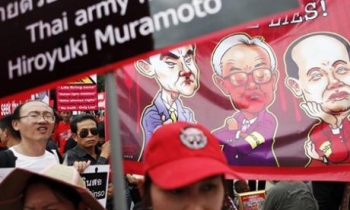About 23 years ago, when I started an advertising agency, there were two initial, formidable hurdles to clear. The INS (then IENS) accreditation, and a DAVP accreditation. The Indian Newspaper Society accreditation seemed logical. After all, if publishers were going to give me 60 days credit and 15 per cent commission for any business I placed with them, they had to safeguard their interests.
What about the DAVP accreditation? What is the DAVP, to begin with? The Directorate of Audio Visual Publicity was set up to be the Government's advertising agency. This was at a time when the Government felt it important to run banks, insurance companies, hotels, telephone companies, steel and zinc manufacturing companies, airlines and in fact anything that had to be run. History has revealed that most of the companies or organisations the Government ran were run to the ground. The DAVP proved inept at handling the growing needs of the burgeoning government sector and therefore took upon itself the role of accrediting agencies such as my own which could then be eligible to handle the advertising of public sector undertakings (PSUs) and even Government departments. Even as a rookie, my mind rebelled against having to be accredited by an outfit whose incapability to handle the demanding challenges of modern communication had given me an entry into the Government sector in the first place.
With time, the Government did away with the necessity of a DAVP accreditation, and realising that public sector undertakings (PSUs) and even government departments needed effective communication, passed the baton on to private advertising agencies. Wisely realising the need for PSUs to stand on their own feet, they restricted their media-buying clout and special rates only to releases of Government departments. The print media, for reasons best known only to them, had agreed to some really pathetically low rates for DAVP releases, something that would repeatedly return to haunt them in future years, especially when these low rates were clubbed with the absolute apathy that reigns supreme in government departments when it comes to settling bills.
Then came a Finance Minister called Dr Manmohan Singh who had a vision of a country developing on the fast track. A country where private enterprise was respected and, in fact, encouraged. That led to a host of far reaching changes under the label of liberalisation.
Today, PSUs are expected to compete with the best in class companies. MTNL has to face Airtel and Hutch. PSU banks like Union Bank of India and Bank of India have to square off against the likes of ICICI and HDFC Bank, not to speak about the foreign banks. Indian needs to build an image to counter that of Jet and Kingfisher.
Government departments too have stepped up their advertising. They now publish messages in public interest covering a wide range of topics from consumer rights to tips on filing tax returns. All this work is being done by private advertising agencies. Agencies which have invested in manpower and knowledge and acquired specialist skills when it comes to advertising, media planning and communications in general.
New Government order
And now the I&B Ministry has passed an order that all government advertising, including that issued by PSUs and autonomous organisations under the Central Government, must be routed through the DAVP. Evidently, this is to increase cost efficiency.
Quite honestly, the objective is laudable. The I&B Ministry goes on to say that it will ensure a greater share of display advertisements for small and medium newspapers. Further, newspapers published in Sanskrit, tribal dialects and in Jammu & Kashmir, Andaman and Nicobar Islands and the North-Eastern States now need to have a substantiated minimum circulation of just 500 copies per day, certified by only their chartered accountants, to be empanelled by the DAVP and therefore benefit from this policy.
The assumptions of this policy and its possible results are staggering by their sheer gall.
Let me first say I am not saying the government does not have the right to route the advertising of its companies and departments through its own advertising agency, the DAVP. I am not disputing the fact that the rates DAVP has negotiated from the print media are not very competitive.
Yet, to say that small and medium newspapers must get an increased share of display advertising presumes the right of the government to distribute largesse in the form of advertising. I strenuously object to that.
This impinges on the taxpayers' money on the one hand and the profitability of government companies on the other. Advertising has to be used as an engine of growth, not a vast bowl to dole out money to whomsoever the government wants to.
Advertising budgets are planned with great care and expertise. Account planners and media planners need to have a thorough knowledge of the market and the audience and are increasingly being held accountable for every paisa of good money spent. They spend years mastering the skills required to mine data and interpret readership surveys and circulation figures. They assiduously build up the expertise to conduct and understand market research to identify the consumer and then decide on the right medium essential to reach her at the optimal cost.
And then some pompous government order dictates that one must make sure the message appears in a small newspaper with circulation not certified by the Audit Bureau of Circulation, with readership not validated by the National Readership Studies Council and a language that is probably never read exclusively. I believe this is definitely not in the interests of the PSUs whom the politicians seem otherwise so overzealous to protect against privatisation. Here they will see the PSUs slaughtered in the otherwise free market and driven to their knees. And what about creative inputs? Does the Government have the knowhow to evaluate and remunerate quality creative work? This is not some `least tender' process they can apply. And with media rates so low, which self-respecting advertising agency will create memorable work for them, especially if they are asked to live off the commission from the media?
I see this as a prescription for disaster. Something akin to the loan melas that emptied the coffers of PSU banks several years ago. Political largesse backed by bureaucratic servility.
I believe this will not help anyone. The advertising agencies will lose billings, the advertiser will lose effective media planning and communication packages and eventually market share, the relevant media will lose revenue. A classic lose-lose situation.
I appeal to the Prime Minister who really showed the right way forward to begin with, to ensure that wisdom dawns and PSUs and other government departments are told to advertise in the only way they should ... in their own best interests and those of the consumer.
(Ramesh Narayan is a communications consultant.)









